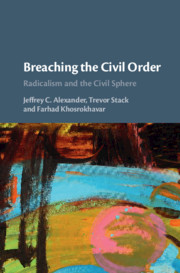Book contents
- Breaching the Civil Order
- Breaching the Civil Order
- Copyright page
- Epigraph
- Contents
- Figures
- Contributors
- Preface
- Introduction
- 1 Wedging Open Established Civil Spheres
- 2 Radical Protest on a University Campus
- 3 Antiracism Movements and the US Civil Sphere
- 4 The Civil Sphere and Its Variants in Light of the Arab Revolutions and Jihadism in Europe
- 5 Restaging a Vital Center within Radicalized Civil Societies
- 6 Anti-immigrant Movements and the Self-Poisoning of the Civil Sphere
- 7 The Civil Sphere and Revolutionary Violence
- 8 “We All Came Together That Day”
- 9 Disobedience in Civil Regeneration
- Commentary
- Conclusion
- Index
- References
Commentary
Matters of Translation
Published online by Cambridge University Press: 25 November 2019
- Breaching the Civil Order
- Breaching the Civil Order
- Copyright page
- Epigraph
- Contents
- Figures
- Contributors
- Preface
- Introduction
- 1 Wedging Open Established Civil Spheres
- 2 Radical Protest on a University Campus
- 3 Antiracism Movements and the US Civil Sphere
- 4 The Civil Sphere and Its Variants in Light of the Arab Revolutions and Jihadism in Europe
- 5 Restaging a Vital Center within Radicalized Civil Societies
- 6 Anti-immigrant Movements and the Self-Poisoning of the Civil Sphere
- 7 The Civil Sphere and Revolutionary Violence
- 8 “We All Came Together That Day”
- 9 Disobedience in Civil Regeneration
- Commentary
- Conclusion
- Index
- References
Summary
This volume provides us with fascinating cases of radical acts and explains how some move from being defined as uncivil to entering the civil sphere. These cases serve as examples of how the translation process can endorse generalizing qualities for particularistic attributes in territorially, temporally, and socially bounded contexts (Strand 2015:253). Civil Sphere Theory (CST) draws attention to the idea of universalism as a metaphysical and potentially representative (almost ontological) category, unaffected by historical change as a mere construct. By taking as its point of departure (paraphrasing Hegel) that universalities are always concrete, historical, empirical manifestations (Alexander 2006:259), CST provides a robust route into critical scrutiny of how particularities become embedded in the current mechanisms of inclusion and exclusion. Combining stable binary categorizations (uncivil and civil) with the established arbitrary empirical content (which is more processual) amplifies how groups, interests, and movements legitimize and justify their particularities as generalized universals through the cultural codes penetrating contemporary discursive and legal institutions. However, more emphasis should be devoted to how translation processes make this happen. The examples in this volume help us in this respect.
- Type
- Chapter
- Information
- Breaching the Civil OrderRadicalism and the Civil Sphere, pp. 261 - 267Publisher: Cambridge University PressPrint publication year: 2019



